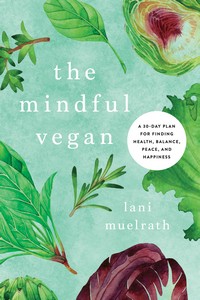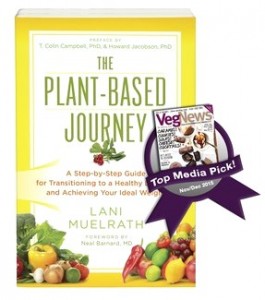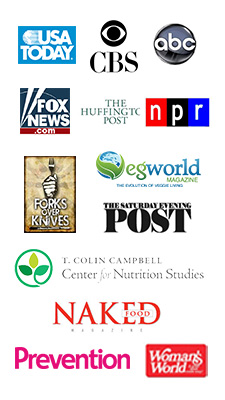 Vegan Mainstream has added a new expert to the
Vegan Mainstream has added a new expert to the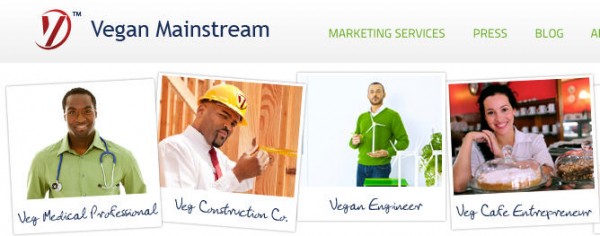 team! Plant-strong fitness expert Lani Muelrath specializes in helping people who struggle with their weight and energy transform their bodies, without hunger or exercising like a maniac. She is a woman of many hats, including Guest Lecturer in Kinesiology at San Francisco State University, fitness expert for Dr. John McDougall’s Health and Medical Center and coach for Dr. Neal Barnard’s 21-Day Vegan Kickstart program.
team! Plant-strong fitness expert Lani Muelrath specializes in helping people who struggle with their weight and energy transform their bodies, without hunger or exercising like a maniac. She is a woman of many hats, including Guest Lecturer in Kinesiology at San Francisco State University, fitness expert for Dr. John McDougall’s Health and Medical Center and coach for Dr. Neal Barnard’s 21-Day Vegan Kickstart program.
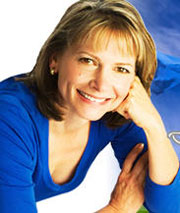 And now Vegan Mainstream readers can look forward to weekly articles from Lani on vegan health and fitness as she joins the blogging team as our resident Health & Fitness Expert! But don’t think she’s escaping without becoming the subject of a feature interview first. During a phone chat, VM talked to Lani about how she got her start as a vegan fitness expert, who influences her and what her plant-strong program entails. We also found out she’s just as interested in our story as we are in hers.
And now Vegan Mainstream readers can look forward to weekly articles from Lani on vegan health and fitness as she joins the blogging team as our resident Health & Fitness Expert! But don’t think she’s escaping without becoming the subject of a feature interview first. During a phone chat, VM talked to Lani about how she got her start as a vegan fitness expert, who influences her and what her plant-strong program entails. We also found out she’s just as interested in our story as we are in hers.
Vegan Mainstream: Where did “plant-strong” come from? I’ve seen the terminology used by Rip Esselstyn in The Engine 2 Diet as well as by other vegan athletes. [Ed. note: This first question was actually much further on the list, but we happened upon the subject while discussing vegan books and blogging before the interview.]
Lani Muelrath: That is interesting. I cannot say it came from one particular place. “Plant-based” has been out there for a while – you see that more and more often. “Plant-based” is a little bit more pedestrian-sounding and definitely goes with dietary guidelines, but the “strong” part conveys becoming fit and healthy at the same time, with the exercise component; being active as well as making changes to your diet.
VM: It’s funny how certain buzzwords catch on. So, you’re going to write more frequently for Vegan Mainstream. Can you talk about how that came about?
LM: I did a couple of guest columns first, the Weekend Blog post and a guest blog. The readers really responded to my articles, [so we decided to do a weekly column], and the voice connection is really working well. That, to me, is a real treat because it’s another venue for connecting with people who are looking for health and fitness, and have that dietary connection. I’ve been working in fitness for a long, long time and I know that until people get that diet thing, they’ll just continue to frustrate themselves when it comes to health and weight loss.
VM: What kinds of things do you want to cover in your column?
LM: I am happy to be a resource for anyone looking for health and fitness and a healthy vegan lifestyle. As we know, not all vegan diets are created equal. You can eat french fries all day and still call yourself a vegan, right? It’s about understanding the differences between what’s going to create more health and what’s going to help address a weight problem. There are many people out there who just don’t know the basics. Or, if someone has gotten to a certain level and is feeling frustrated, maybe they have a medical problem they need to address, or maybe they have some body shaping concerns. I can be a resource for all of that. It’s very exciting to me that in the last year I have embraced the dietary position as a model for weight loss, in an even more central way to my programs than ever before. It has just been the last few months that my website has reflected that. I’ve been in the fitness industry for 35 years! As I moved through time I saw that the people who really paid attention to my suggestions on the dietary guidelines were the ones making the biggest differences, the biggest changes with their health and weight. There are not many people out there in fitness who are really addressing this combination. That’s why I’m so excited to be a part of the Vegan Mainstream team – because I’ve got the resources and I can give people looking for that combination a place to connect.
VM: When did you first transition to veganism?
LM: Well, I was vegetarian for a long, long time, probably about 38 years. Over that period of time, I also included dairy. I did not, for the most part, include eggs, but I was using dairy products, and the weight issue was always something I needed to deal with. I’m one of those people who gains weight easily; even as a vegetarian, my weight would go up and down. I always really struggled with it and was constantly addressing it. I learned, when I was able to finally eliminate dairy products and move away from expelled oils and those types of things, what a difference it made and how easy it was to maintain a healthy weight, and how much more effective exercise was. That didn’t mean I always adhered to that. It took me a while to make that final leap.
VM: What made you decide to focus on women specifically for your fitness program?
LM: Because of being able to meet the special needs of women. Everything I teach of course applies to men as well, but women have special concerns: special life transition concerns, special body shaping concerns, certain social issues that I’ve experienced, and can help coach them on. For all those particular concerns of women I have personal experience. I lead Body Transformation Booty Camps that last three weeks and we do a low-fat, vegan diet during that time. It’s because of dietary changes and simple exercise that women lose the weight, and the exercise component is so much easier once you get the diet in gear.
VM: And these are women who aren’t typically eating vegan or even vegetarian?
LM: Not necessarily, I have both. A lot of the women who’ve come to me through the years have come to me through other avenues. Their discovery of this particular dietary plan is through their contact with me, so it’s really put me in a position of being able to help them understand and coach the transition. I do have a Cornell University T. Colin Campbell Foundation Board Certification in Plant-based Nutrition, so that’s really been helpful in giving me a lot of material to bring to them. My strength is making the connection between the two [healthy vegan diet and exercise]. You can go to a dietician or nutritionist and get the guidelines, and you can read the book about plant-based nutrition and get all the information. My specialty is making that connection of how to make it happen in your life.
VM: What do you see as the biggest hurdle for people to get active and change their diet?
LM: There are two different components, diet and exercise. With exercise, a lot of it is the motivation. There’s confusion about what to do. That can be overwhelming. “Am I supposed to lift weights, am I supposed to do cardio?” – so that’s the first hurdle. It really boils down to motivation and finding the time…because everybody’s busy. I address those two things specifically. In terms of time, the American College of Sports Medicine has recently come out with their guidelines of what you really need to do to be able to achieve longevity or optimal fitness. So I work with that, and that’s what our Booty Camp schedule is based around. I’ve taken those components and laid it out really simply. That has taken away the confusion and it gives people something to work with.
We’ve all got this inherent laziness which is simply based on our survival. Our biology has not caught up with our technology. We used to be so required to move about during our day to get things done. Now we have all these conveniences that let us sit at our computers or in our cars, and we aren’t required to move, yet we are hardwired to conserve energy. You can understand why people have a motivation problem. We are kind of programmed to wait until we absolutely need to move, but we used to be required to move just to go about our survival. See where the conflict is?
So I tell people it’s not their fault. People are programmed to want to take it easy. Understanding that really helps. ”Oh, I get it, it’s not that I’m a bad person, I just realized it’s going to take effort to engineer this.” The other thing, a big part of it, is what I call under-the-surface obstacles to our success. Those are conflicts we may have about shape or being able to have a different body image. [And sometimes] we use certain food items to relieve stress. As we know, there’s a biochemical cascade with high-fat, high-sugar foods. It’s really a relief for people to understand that. No wonder we use those foods, because they create that nice dopamine release! [There are questions I encourage people to ask themselves:] ”Do you really want that? What does it mean for you? Do you want to be healthy and why do you want to be healthy? What is your real reason for that?” And it needs to be really specific.
On the diet, I give people all the information they need for making decisions about what they want their dietary plan to be. Do they want to eliminate meat, dairy and eggs? I can give them all the information that will help support that decision. I can’t tell them what to do. I can be a resource, I can show them how to do this.
Once someone makes the decision to follow a plant-strong diet, usually the biggest obstacle is getting them to eat enough – because they’re not used to the volume that you can and need to eat on this type of diet. Questions are emerging out of my current Booty Camp. A woman named Barb recently said to me, “I’m so hungry by mid-morning! For lunch I have some vegan pea soup and rice, but I’m so hungry in the afternoon!” So I said, “What did you have for breakfast?” And she said, “Well, I had half a cantaloupe because I felt so guilty for eating all those pita chips the day before.”
Barb’s question demonstrates two huge mistakes that people make when they’re trying to lose weight, and these are behavioral. First is not eating enough. If I had half a cantaloupe in the morning, I’d be hungry half an hour later too. I would not be able to go until lunch and hope that a little bit of soup and rice would get me through. Anyone who has had that experience [of trying to lose weight by any sort of process] can relate to this trying to hold back; it just backfires. Because you get over-hungry and crave all the wrong things. Trying to make up for what you ate yesterday works against you. At the time you are ready for good food, you’re usually too busy, at work or in the car, and then it’s too easy to be driven to eat these high-fat, high-sugar foods that are best designed for putting fat on your body or disallowing you to lose the fat stores you have. For Barb, I suggested we needed to back it up and to eat a lot, early and often. The biggest thing is eating enough on time.
There’s this diet mindset of quantity control, half a cup of this, half a cup of that. If someone told me they had half a cup of oatmeal and asked why they’re still hungry, I would say, “It’s because you only had half a cup of oatmeal!” When I have oatmeal, it’s a big bowl, and I’ll pile it with fruit; it’s with gusto! This fear people have, from the diet mentality, they think if they’re hungry between “meals”, there’s something wrong. It’s a hurdle they don’t see. When you’re eating this way [healthy low-fat vegan] it’s quite likely you’ll be hungry more often. If you’re a body-controlled eater, there are ways to meet that need with a plant-based diet. It allows you to eat according to appetite and still be slim. It was my dream to be able to help people to understand this.
VM: Do you find yourself often having to unravel these food myths like portion control?
LM: Like crazy! Remember the Zone Diet? That really influenced the diet culture, creating more of that carbophobia. Women are so afraid to eat those potatoes. Debunking food myths is a big part of my program. When I say, “Here’s what I ate,” they are so relieved to see rice or potatoes for dinner! You can be slim and well-fed at the same time.
VM: Going in to that, do you have to respond to the statement “Not all vegans are thin?” and how do you respond?
LM: It depends on what you’re eating. If you’re eating a high-fat vegan diet, you can have as many weight problems as an omnivorous diet that’s too high in fat for your energy needs.
VM: Have you had pushback from people who say they’re doing all the right things but can’t get thin?
LM: Well, what does that mean, ‘doing all the right things’? I need to see what exactly what you’re eating every day. For example, one big obstacles is olive oil. It’s very calorie dense. If you think about it, we all agree sugar is junk food, right? When you take sugar cane, squeeze all the juice out of it and highly refine it, it becomes devoid of all its nutrients. What’s the difference between that and squeezing the oil out of an olive, or an avocado or a nut? It’s because of marketing I think. “If olive oil is better for me than other oils, I should just pour it on everything,” is the thought process. Olive oil is less damaging than other saturated fats, and so from that we got, “it’s better for me, we should have more of it.” It adds to the fat content of our diets. It contributes to people’s weight problems.
So, if someone is saying they’re doing everything right, I don’t know what that means. What do you think is right, show me what you’re eating and I’ll show you where you need to take another look and this may help you with the problems you’re having. I love doing that for people. It can be so eye-opening and it can end so much frustration.
VM: Who are some of the inspirational people in the vegan movement that inspire you?
LM: Colleen Patrick-Goudreau [The Compassionate Cook] is a big influence on me. She and I met up once again about three weeks ago at the [Dr.] McDougall Advanced Study Weekend in Santa Rosa. She does a lot of their celebrity chef presentations. Certainly anything with John Robbins
. Gene Baur’s work on Farm Sanctuary. And Vegan Mainstream is a great place to get inspiration! There’s really good work coming out of there.–
Find out more about Lani by visiting www.lanimuelrath.com. Lani has prepared a FREE Fitness Breakthrough Kit, including one of her Fit Quickies, with audio and video. Click here to download your copy today.
Thank you, Vegan Mainstream!

